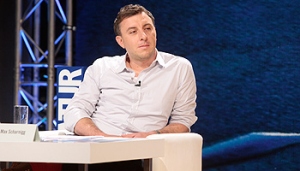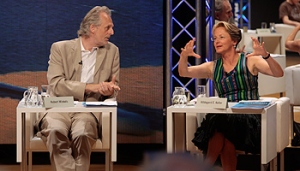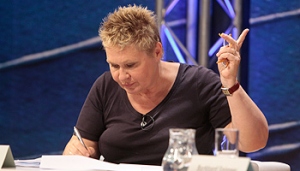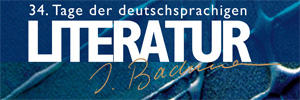 Max Scharnigg (Bild: Johannes Puch)
Max Scharnigg (Bild: Johannes Puch)
Max Scharnigg (D)
German author Max Scharnigg read: “Die Besteigung der Eigernordwand unter einer Treppe” [The ascent of the Eiger north face under the stairs]. Most of the jury members did not like the text, not least because of its linguistic “slip-ups”.
Confusion brought about by another man’s shoes
Scharnigg, German author and journalist, was proposed by Hubert Winkels for the competition.
A man – journalist and “special human being” – one day no longer enters his flat, and instead now writes “head texts” about ascending the north face of the Eiger in 1938 while lying under the stairs. The confusion brought about by another man’s shoes outside his flat was sufficient to throw him out of his world.
Author portrait
Reading
Discussion
Friendly criticism at the beginning
At the beginning, Paul Jandl’s criticism was still quite friendly. He said that what he liked about the text “very much” was “that the rival while doing his sordid business leaves his dirty shoes outside the front door” – after that, it could have been exciting. But: “In actual fact, the text goes back down the stairs.”
This literature would also have to be checked for its “ability to produce punch lines”. “It was intended as a small text, and the author managed that”, Jandl believes.
 Max Scharnigg (Bild: Johannes Puch)
Max Scharnigg (Bild: Johannes Puch)
“How does he get to be under the stairs?”
Hildegard Elisabeth Keller was “sceptical” with regard to narrative structure, plot and character construction and she had to ask herself why the many elements in the text have to take place “under the stairs of all places”. “How does he get to be under the stairs?” The question whether the protagonist is a martyr or a workaholic would be interesting.
“Lots of clumsiness”
“The protagonist evidently lives off odour”, that’s how Alain Claude Sulzer started his criticism, because the protagonist appears to eat nothing and have no metabolism. The text talks about “something very simple”, according to Sulzer: “A man finds out that his wife cheats on him and goes under the stairs.”
The text doesn’t talk about much more – while using a huge number of words. “When I take a closer look at the text, I see lots of clumsiness. The text is much too over-orchestrated without telling me anything.”
 Hubert Winkels und Hildegard E. Keller (Bild: Johannes Puch)
Hubert Winkels und Hildegard E. Keller (Bild: Johannes Puch)
“Was getting better as you re-read it”
Meike Feßmann told the audience and her colleagues about her “striking reading experience”, namely that the text got better the more often she read it. At first, she thought she was in a “journalist’s fantasy” (“a nice image that he withdraws under the stairs, but nothing else”).
After reading the text several times, however, this “harmless story“ opened up things for her that were done very well: for instance, you find out a lot about the woman on the first floor. In this “story of a threat”, the protagonist builds his interior worlds everywhere.
 Karin Fleischanderl (Bild: Johannes Puch)
Karin Fleischanderl (Bild: Johannes Puch)
Reminiscent of Kafka’s “Hunger Artist”
“It is surprising how different reading experiences can be”, said Burkhard Spinnen, who was reminded of Kafka’s “Hunger Artist” by the fact that the story’s protagonist does not eat. This comparison triggered protest among his colleagues.
The linguistic slip-ups in the text “threw him out” of the text several times, and the text lacks sovereignty: “It is neither explained nor borne out how the different keys are supposed to work together.” The author is merely “a stupid person, the text knows everything”.
Text close to photorealism
Hubert Winkels, who had invited the author, did not want to rid the text of its “Kafka bonus”, even though he located it close to photorealism. If anything, you can talk about a gentle “back and forth”, according to him. The juror then said that the love story is told using “tiny little details”. This is a text that employs structure a lot, and it opposes the ascent of the Eiger north face with the “regressive situation under the stairs”.
“Idea gets stuck in the stairs”
“In principle, the idea of the stairs is quite funny, but the text gets stuck in it”, was Karin Fleischanderl’s response. The “empty wordiness” of the text has been “doubled” by the people doing the exegesis: “confused, peculiar, incoherent”.
Barbara Johanna Frank
 TDDl 2010
TDDl 2010